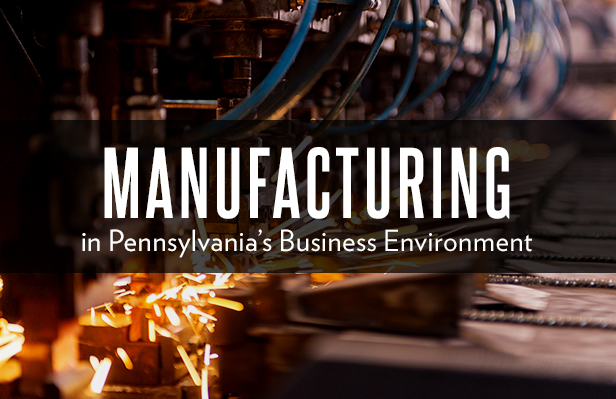Commentary

Don’t Wait on Washington for Manufacturing Jobs
Note: This commentary was published in the Pocono Record, York Dispatch, Chambersburg Public Opinion, Pittsburgh Tribune-Review, and other news outlets.
During his campaign stops in Pennsylvania, President-elect Donald Trump touted his intention to bring manufacturing jobs back to the state. That’s a worthy goal, but the truth is the Keystone State doesn’t need to wait for a president of either party to start revitalizing its manufacturing sector.
Look no further than the recent news that a $500 million manufacturing plant will be built in Texas instead of Marcus Hook, a small town in Delaware County, for a lesson in how we can improve our business climate without help from Washington, D.C.
“I was disappointed to choose Texas, but we had to choose the place where we had easy access to feedstocks,” said Mark G. Nikolich, chief executive of Braskem America, the plant’s Philadelphia-based developers. “Decisions are already being made by businesses like ours to move elsewhere because [infrastructure] has not evolved in Pennsylvania fast enough, completely enough, through the entire logistics chain.”
Regulatory delays in the construction of new pipelines led Braskem to choose Texas. Such government-imposed hurdles are just one of many impediments for Pennsylvania’s manufacturing sector, which accounts for $79 billion in gross state product and 568,000 jobs, according to the Center for Manufacturing Research.
In fact, Pennsylvania’s attractiveness to manufacturers earned a dismal “C-” this year from Ball State University’s Center for Business and Economic Research—down from a “C” in 2015.
One of the main factors dragging Pennsylvania lower is our tax climate, graded a “D-,” which has a major influence over where manufacturers locate their operations. “I think it’s fair to say that in Pennsylvania the effective tax rate is rather burdensome,” said Michael Hicks, director of the research center.
Indeed, Pennsylvania ranks near the bottom of the 50 states in two key areas—corporate taxes (44th) and unemployment insurance taxes (45th), according to the Tax Foundation.
Why should job creators put down roots here when dozens of other states are more tax-friendly? The tendency to skip over Pennsylvania is nothing new, especially considering the sorry state of economic growth in the last few decades.
Between 1991 and 2015, Pennsylvania ranked 46th among the states in job growth, 45th in personal income growth, and 46th in population growth. Last year alone, Pennsylvania lost a net 41,000 people to other states.
Yet while Pennsylvanians were fleeing to greener pastures, Harrisburg pushed through record-breaking spending and continued to look for more things to tax. In fact, over the past 25 years, the size and scope of state government has grown almost 200 percent, from a $27 billion operating budget to nearly $80 billion this fiscal year.
Are we better off because of it? Pennsylvania’s unemployment rate stands at 5.8 percent—nearly one percentage point above the national average. Of the 50 states, Pennsylvania had the second largest increase in the unemployment rate over the past year.
Politicians wedded to the status quo propose raising the minimum wage and increasing government spending to create jobs. In reality, both are proven disincentives to private-sector employment.
Corporate welfare subsidies are another failed solution. Pennsylvania leads the nation in these taxpayer-funded gimmicks, handing out $800 million this year alone to select businesses.
The real solution is controlling state spending. Eliminating millions in corporate subsidies would be a great first step, allowing lawmakers to lower taxes on all businesses not just those with the most lobbyists in Harrisburg.
Additionally, lawmakers must address our astronomical corporate income tax rate. At 9.9 percent, it ranks second in the nation. Add the federal tax rate, and Pennsylvania’s corporate income tax rate is the second highest in the world.
Job creators have undoubtedly chosen other states because of this high tax rate, meaning fewer opportunities for Pennsylvanians and less investment into our economy.
Harrisburg must control its habitual overspending by reforming the state’s primary cost drivers. This includes addressing our public pension crisis—a perennial black mark on the state’s resume for business investors.
Pennsylvania has a rich manufacturing tradition dating to the 19th century, when its steel industry began to establish a leadership position it has since lost. Significant state government reform can revitalize our manufacturing future, and we don’t have to wait for the president to get the ball rolling.
# # #
Gordon Tomb is a senior fellow with the Commonwealth Foundation,
Pennsylvania’s free market think tank.